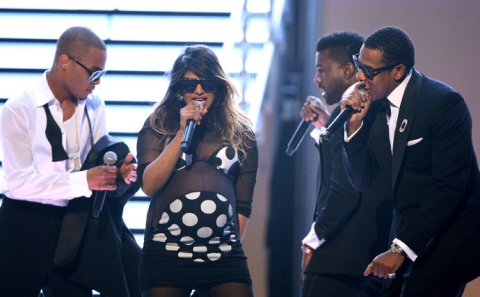
One of the most popular songs of 2008 was "Paper Planes" by M.I.A., a song which created an extremely unique sound blending a sample from The Clash's "Straight out of Hell" with a very familiar Southern snap dance rhythm. The combination has become one of the most infectious melodies to date and her popularity in the hip-hop scene increased significantly with her cameo on "Swagga Like Us" with Jay-Z, Lil Wayne, Kanye West, and T.I. which sampled "Paper Planes." With a sound that can be described as global, M.I.A. is in a niche that is occupied by few other female artists. Interestingly enough, her popularity in hip-hop is part of a larger trend in which many of the biggest female names in hip-hop right now are not rappers who have established themselves in the genre. In fact, there's been a significant decrease in the presence of female rappers in mainstream hip-hop.
While a few years ago it seemed as if female rappers such as Missy Elliot and Lil' Kim were a reliable presence on the radio, the fresh faces and original sounds that have dominated in the past few years have been male, both in commercial and underground hip-hop. Furthermore, female rappers are rarely even featured on mainstream singles as many male rappers feel content with branching out into other genres, particularly R&B and pop, to find female artists who will broaden the appeal of their music. Artists like Rihanna, Beyonce, and Keri Hilson are guest artists on mainstream songs and numerous male R&B artists such as John Legend, Neyo, and T-Pain have been dominant with their appearances as guest artists on mainstream hip-hop songs.
Given the current direction of hip-hop with unique artists such as Kid Cudi, Drake, and The Cool Kids quickly making a name for themselves outside of the traditional hyper masculine image of many mainstream artists, I believe that there are amazing opportunities for female hip-hop artists to assert themselves. Traditionally, many female hip-hop artists have been reactive to the norms and contexts established by male rappers. Consequently, when the men have been violent and hyper-sexual the women have followed suit. However, as hip-hop is expanding its paradigm for what is normative and authentic, women should be encouraged to create their own niches and define their music and their images outside of the archetypes that have traditionally been placed before them.
